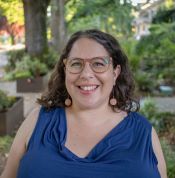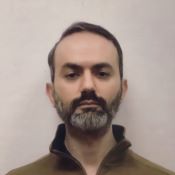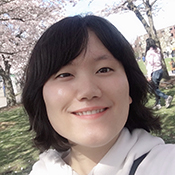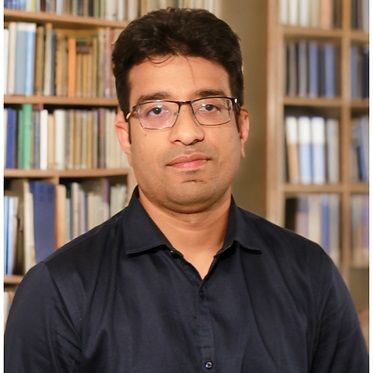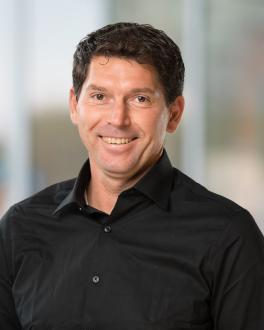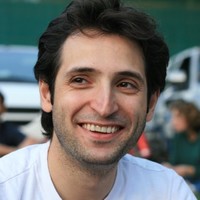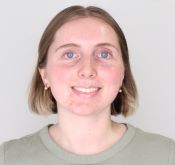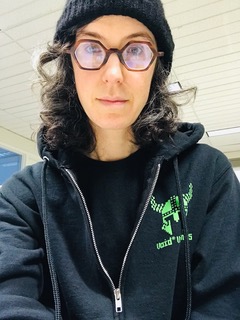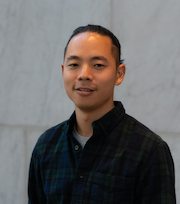Transportation at Portland State University

We inform transportation decision making through research, building the capacity of the transportation workforce, supporting the education of transportation professionals, and engaging students in research.
The Transportation Research and Education Center (TREC) at Portland State University (PSU) is a multidisciplinary hub for all things transportation.
We are home to the Initiative for Bicycle and Pedestrian Innovation (IBPI), the data programs PORTAL and BikePed Portal, the Better Block PSU program, and PSU's membership in PacTrans, the Pacific Northwest Transportation Consortium. Our continuing goal is to produce impactful research and tools for transportation decision makers, expand the diversity and capacity of the workforce, and engage students and professionals through education, seminars, and participation in research. Learn more about our transportation research and education programs.
Annual Reports
- 2023 TREC Annual Report
- 2022 TREC Annual Report
- See previous reports from the National Instutute for Transportation & Communities (NITC) program, a U.S. DOT-funded university transportation center which was headquartered at TREC from 2012–2024.
Our History at Portland State University
As Oregon's only urban public global research university, Portland State University offers tremendous opportunity to nearly 28,000 students from all backgrounds. Our mission to "Let Knowledge Serve the City" reflects our dedication to finding creative, sustainable solutions to local and global problems. In 1966, Dr. Walter H. Kramer founded the first transportation studies center in the Department of Marketing. After decades of investment in PSU's transportation studies, our faculty and staff expertise earned PSU the leadership of a USDOT-funded regional university transportation center (UTC) from 2006–2014, called the Oregon Transportation Research and Education Consortium (OTREC). We then successfully competed for more federal grants and led a national UTC, the National Institute for Transportation and Communities (NITC), from 2012 until 2024. Today we are a member of the Pacific Northwest Transportation Consortium (PacTrans), a regional UTC. Our center and staff have grown far beyond the initial UTC grants, and now encompass a wide variety of programs.
Our Staff
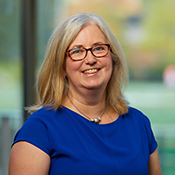 Jennifer Dill, PhD
Jennifer Dill, PhD
Director
Professor, Nohad A. Toulan School of Urban Studies and Planning
503-725-5173 | jdill@pdx.edu
https://jenniferdill.net/
Twitter | TREC Researcher Profile
Dr. Jennifer Dill is a professor in the Nohad A. Toulan School of Urban Studies and Planning at Portland State University (PSU) and Director of the Transportation Research and Education Center (TREC) at PSU. Dr. Dill is also the editor-in-chief of the Transportation Research Record.
Professor Dill is an internationally known scholar researching the relationships between transportation, land use, health and the environment, focusing on active transportation. Before entering academia, Professor Dill worked as an environmental and transportation planner in California. That experience motivates her teaching and research, which aims to inform practice and policy. She has published extensively in peer-review journals and has served as principal investigator or co-PI on over $4.3M in research projects and over $28M in federal center funding. Her research has been covered by Wired, Governing, USA Today, the PBS NewsHour, Here and Now, Marketplace and the Atlantic. She has served on and chaired Transportation Research Board committees and is on the editorial boards of the Journal of Transportation and Health, Transportation Research Record and the Journal of Transportation and Land Use.
Dr. Dill has a Ph.D. in City and Regional Planning from UC Berkeley, an MA in Urban Planning from UCLA, and a BS in Environmental Policy Analysis and Planning from UC Davis. She is also an aluma of the Eno Future Leaders program.
Rebecca is the Events & Office Coordinator for TREC, providing administrative support and managing logistics for TREC's events. She has a background in creative writing, and holds an M.F.A. from North Carolina State University. When she's not working, she likes to spend time reading and writing poetry, riding her bicycle, and snuggling with her cat.
Basem Elazzabi, PhD
Senior Research Associate
elazzabi@pdx.edu
Basem is the head of programming and development for the PORTAL and BikePed Portal projects at TREC. He is responsible for maintaining and developing the database and the infrastructure of both projects. He also does various data analysis and visualization tasks. Basem received a PhD in Computer Science from Portland State University with a focus in database and data analysis. He also received his BS in Computer Science also from Portland State University. He has almost 20 years of experience in system analysis and development. His main interests are database systems, data analysis, distributed systems, and big data. His main research topics focus on how to facilitate data analysis for typical and non-technical data analysts. One of the main research topics that he works on is how to build the next generation data-analysis ecosystem in which institutions (government and private) can easily store their massive data and have easy access to data analysis tools to support and improve data-driven decision making.
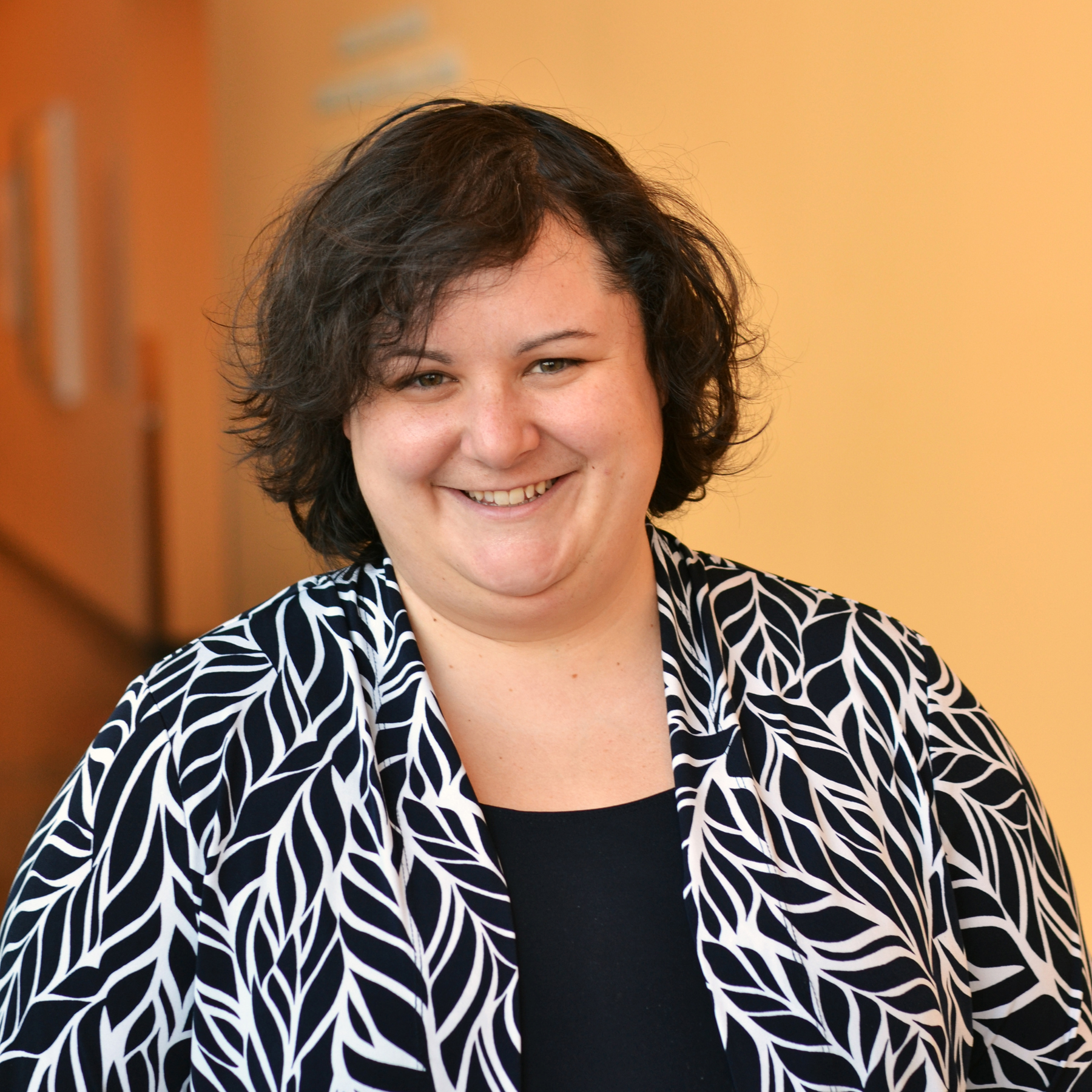 Lacey Friedly
Lacey Friedly
Communications Coordinator
503-725-8545 | rlacey@pdx.edu
Lacey is the communications coordinator for TREC. She connects with researchers, writes articles, and documents (through pictures, videos, and model towns) the value of the transportation research being done at TREC and through the NITC program. Before TREC, Lacey was the acquisitions editor for Dark Discoveries magazine. She also managed the editing department at Ooligan Press, Portland State University's student-run publishing house. She graduated from PSU in 2013 with a master's in book publishing. In her spare time Lacey enjoys swimming, reading, and making stop-motion animation videos. she/her/hers
Kyuri Kim is an adjunct research associate for TREC, working on multiple projects related to active transportation and the safety of vulnerable road users, including literature review, data collection, analysis, and visualization. Her primary research interest is improving pedestrian safety, and her dissertation topic was to understand the relationship between pedestrian crash factors and perceived safety for her PhD. She loves to walk, bike, and try new micro-mobility modes and keeps studying vulnerable road users' safety to create walkable and bike-friendly cities. She received her PhD in urban studies at PSU and BS and MS in urban planning and engineering at Yonsei University in South Korea.
Jackie Krantz
Communications Assistant
jkrantz@pdx.edu
Jackie Krantz supports TREC communications including social media, graphic design, and copywriting, as well as disseminating results of research published by the National Institute for Transportation and Communities (NITC), a program of TREC.
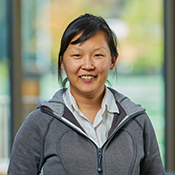
Tammy Lee, PhD
Transportation Data Program Administrator
503-725-2884 | leetam@pdx.edu
Tammy is working on a variety of projects for TREC, including documentation, data synthesis, analysis, and visualization supporting ongoing work with PORTAL and Bike-Ped Portal. Tammy received a BS in Genetics & Plant Biology from UC Berkeley before earning a PhD in Environmental and Natural Resource Sciences from WSU. Prior to joining TREC she worked as a data scientist for a political digital media consulting firm. When not working she's either hiding in the forest or experimenting in the kitchen.
 John MacArthur
John MacArthur
Sustainable Transportation Program Manager
503-725-2866 | jhmacart@pdx.edu
Twitter | TREC Researcher Profile
Mr. John MacArthur is the Sustainable Transportation Program Manager at TREC at Portland State University and an instructor in civil and environmental engineering, teaching on new & emerging technologies in transportation. He is active in research related to sustainable and equitable transportation, particularly in the areas of emerging tech such as e-bikes, bike share, transit, and the relationship between transportation and public health. Mr. MacArthur is the Section Chair for Transportation Research Board’s AME00 Transportation and Society and a member of Innovative Public Transportation Services and Technologies (AP020). He received his BS in Civil Engineering from Lehigh University and a MS in Environmental Health Sciences from the School of Public Health at the University of Michigan.
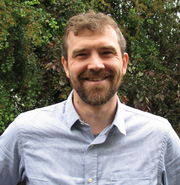 Nathan McNeil
Nathan McNeilNathan McNeil is a Research Associate at Portland State University's Transportation Research and Education Center. His research focuses on active transportation safety and travel behavior, emerging mobility and data sources, and how to make sustainable transportation accessible and easy for all people. Nathan received a master of urban and regional planning from Portland State University (PSU) and studied history at Columbia University as an undergraduate. Prior to PSU, Nathan worked for the Metropolitan Transportation Authority in New York City as a performance auditor where he evaluated capital programs and contractors.
Saurav Kumar Singh
Website Developer
Holding a Master's in Computer Science and 6 years of experience, Saurav brings a deep proficiency in Python, machine learning, LLM, and cloud computing. His expertise extends to AI application development, where he has successfully contributed to Generative AI Projects, AI chatbots, and scalable cloud solutions.
Transportation Researchers at PSU
Portland State University embraces interdisciplinary research by exploring the unique ways in which transportation intersects with so many aspects of our daily lives. Below are the core of our transportation research faculty and staff, but you can find our comprehensive list of contributors in our Researcher Directory.
Dr. Jason C. Anderson is a senior research associate and adjunct instructor at Portland State University. Dr. Anderson’s expertise is in data analytics, with an emphasis on transportation safety, travel behavior, big data, and transportation policy. His work on policy-related research has led Oregon and local agencies to develop and maintain safety programs and treatments for freight transportation, active transportation, and speeding mitigation. Dr. Anderson’s research on transportation safety has helped advance fundamental knowledge on various factors that influence the risk and severity of freight and active transportation-related crashes, and the impacts of speed limit regulatory changes on driver behavior and safety. Dr. Anderson focuses on innovative strategies to generate multidisciplinary solutions to technology-driven questions related to transportation engineering. Dr. Anderson is also an avid sports fan who does not miss a Sacramento Kings game or a NASCAR race.
Dr. Tanmoy Bhowmik joined the Department of Civil and Environmental Engineering at Portland State University as an Assistant Professor in Fall of 2023. Prior to that, he worked as a post-doctoral associate and graduate faculty scholar at University of Central Florida. Dr. Bhowmik's research primarily focused on the formulation and development of statistical and econometric models and applying them to different transportation sectors - including transportation planning, safety, and energy - to understand the underlying behavioral patterns and decision processes. His ongoing work deals with analyzing the impact of emerging technologies (electric and connected vehicles) on transportation environments, public health, and energy consumption. Dr. Bhowmik is currently a member of the editorial board of Frontiers in Future Transportation, and serves as a panel member in two NCHRP projects.
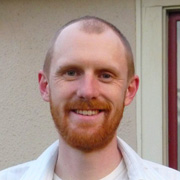
Joseph Broach is a Research Associate with the Transportation Research and Education Center (TREC), an Instructor in the School of Urban Studies and Planning at Portland State University, and a Senior Researcher and Modeler at Metro (MPO). His work primarily focuses on transportation data, behavior, and modeling, and he helped design the Portland region's next-generation bicycle model in conjunction with Metro.
Joe's research projects include Incorporate Emerging Travel Modes in the Regional Strategic Planning Model (RSPM) Tool, Transferability & forecasting of the Pedestrian Index Environment (PIE) for modeling applications, and Travel Mode Choice Framework Incorporating Realistic Bike and Walk Routes.
Dr. Peter Dusicka is Professor and Chair of Civil and Environmental Engineering in the Maseeh College of Engineering & Computer Science at Portland State University. His primary research interests are in earthquake structural engineering, focusing on infrastructure resilience. Dr. Dusicka also manages iSTAR (infraStructure Testing and Applied Research) Laboratory, an on-campus facility for large scale experiments including real time shake table tests.
 Aaron Golub, Ph.D.
Aaron Golub, Ph.D.
Director, Nohad A. Toulan School of Urban Studies and Planning
Professor, Urban Studies and Planning
agolub@pdx.edu
Twitter | Researcher Profile
Dr. Golub is an associate professor and director of the Toulan School of Urban Studies and Planning at Portland State University. His work focuses on the social equity impacts of current transportation planning practices – how people participate in planning, and who wins and loses from transportation plans and investments. Dr. Golub teaches courses on urban transportation policy, planning research methods, transportation finance and public transportation.
His research explores policy, finance, environmental justice, public transportation, sustainability, bicycle transportation, social change, the Distributional Effects of Regional Transportation Plans and Projects, Applying an Equity Lens to Automated Payment Solutions for Public Transportation, and more.
Dr. Arash Khosravifar joined the Geotechnical Engineering group in Civil and Environmental Engineering Department at Portland State University (PSU) in December 2015. Prior to joining PSU, he worked for Fugro Consultants Inc. in California where he worked on seismic hazard studies for transportation projects (bridges) and energy developments (oil and gas, wind turbines). He obtained his Ph.D degree from University of California, Davis where he conducted research on analysis and design of piles in liquefied soils.
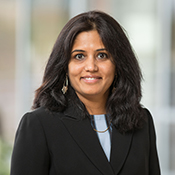
Sirisha Kothuri, Ph.D. is a senior research associate in the Department of Civil and Environmental Engineering at Portland State University. Dr. Kothuri’s primary research interests are in the areas of multimodal traffic operations, bicycle and pedestrian counting, and safety. Dr. Kothuri is the research co-chair of the Transportation Research Board’s Pedestrians Committee (ANF10) and the Bicycle and Pedestrian Data Subcommittee (ABJ 35(3)) and a member of Traffic Signal Systems committee. Dr. Kothuri received her BCE from Osmania University, India, MSCE from Louisiana State University, Baton Rouge and Ph.D. from Portland State University.
Dr. Kothuri's research includes investigations into Incorporating Pedestrian Considerations into Signal Timing, Improving Walkability Through Control Strategies at Signalized Intersections, Addressing Bicycle-Vehicle Conflicts with Alternate Signal Control Strategies and Improving Bicycle Crash Prediction.
 Jenny Liu, Ph.D.
Jenny Liu, Ph.D.Jenny Liu is an associate professor of urban studies and planning at Portland State University. She is an environmental and resource economist with a focus in transportation economics. Her research interests include the economics of alternative energy sources, links between transportation choices and environmental issues, the effects of physical infrastructure networks and social networks on the adoption of transportation technologies, and technology adoption and its effects on climate change, particularly within the urban and development contexts.
Dr. Liu's research has looked into Understanding the economic impacts of urban greenway infrastructure, Measuring the Impacts of Social Media on Advancing Public Transit, and the Economic and Business Impacts of Street Improvements for Bicycle and Pedestrian Mobility.
Dr. Christopher M. Monsere is Professor and Chair of Civil and Environmental Engineering in the Maseeh College of Engineering & Computer Science at Portland State University. Dr. Monsere's primary research interests are in design and operation of multimodal transportation facilities including user behavior, comprehension, preferences, and the overall safety effectiveness of transportation improvements. Dr Monsere is a member of ANF20, the Bicycle Transportation Committee, the past co-chair of the Transportation Research Board's Safety Data, Analysis, and Evaluation committee (ANB20) and a past member of the TRB Task Force to develop the Highway Safety Manual (ANB25T). Monsere received his BCE from the University of Detroit Mercy; his MSCE and Ph.D.with an emphasis in transportation from Iowa State University. Dr. Monsere is a licensed professional engineer in the state of Oregon.
Dr. Monsere's research efforts include Improving Walkability Through Control Strategies at Signalized Intersections, Improving Adaptive Response Signal Control Performance, and Effective Design Treatments for Right-Turns at Intersections with Bicycle Traffic .
Diane Moug is an Assistant Professor in the Civil & Environmental Engineering department at Portland State University. She joined the department in 2017 after earning her PhD from the University of California, Davis. Her research focuses on how to improve in-situ testing for characterization of geotechnical soil properties and engineering behavior. Her research has a particular focus on improving geotechnical engineering methods with the cone penetration test for characterizing earthquake behavior of soils, and characterizing non-standard soil types. Her work has included studies of diatomaceous soils in Oregon, soils treated with microbially induced desaturation, and intermediate soils.
Dr. Schumacher’s research is on non-destructive evaluation (NDE) and management of civil infrastructure with a focus on concrete structures. He is interested in stress wave and vibration-based techniques such as acoustic emission and ultrasonic monitoring and impulse response testing, respectively. Additionally, he has been collaborating with faculty at the University of Delaware to develop a novel distributed carbon nanotube (CNT)-based sensor that can be integrated with structural composites to form a self-sensing reinforcement to repair and rehabilitate concrete and steel structures. Finally, he is interested in video-based techniques to monitor structural motion. His additional research interests include the behavior and durability of concrete structures, bridges subject to wave forces, imaging and data fusion, data analysis and signal processing, and civil infrastructure asset management. Dr. Schumacher is the chair of ACI Committee 444 - Structural Health Monitoring and Instrumentation and a registered professional engineer (PE) in Delaware. He offers courses on structural analysis, vibrations and structural dynamics, matrix structural analysis, prestressed concrete, and sensing and monitoring for structures.
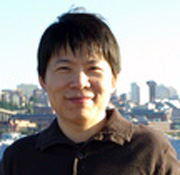 Liming Wang, Ph.D.
Liming Wang, Ph.D. Liming Wang is an assistant professor in PSU's Toulan School of Urban Studies & Planning. He teaches courses in Travel Demand Modeling, Transportation and Land Use, and Data Analysis Methods. His research takes a data-driven approach to address challenging issues in planning, in particular those intersecting land use and transportation. His recent research projects include data integration techniques for transportation and land use modeling, development and evaluation of comprehensive performance measures for transportation and land use systems, and regional strategic planning tools.
Dr. Wang has conducted research on Continuous Data Integration for Land Use and Transportation Planning and Modeling, Evaluating and Enhancing Public Transit Systems for Operational Efficiency, Service Quality and Access Equity, and the development of a data science course, Introduction to Scientific Computing for Planners, Engineers, and Scientists.
Dr. David Yang is an Assistant Professor in the Department of Civil and Environmental Engineering at Portland State University. He joined the department in Fall 2020, after working as a postdoctoral researcher at Lehigh University. His research strives to advance effective and efficient management for structures and infrastructure systems, primarily through the integration of structural engineering and probabilistic machine learning methods. He has extensive experience in structural reliability analysis and calibration, risk management for transportation infrastructure networks, and probabilistic life-cycle management for deteriorating structures. His ongoing work deals with (a) robust climate adaptation strategies for vulnerable structures and infrastructure systems and (b) probabilistic machine learning for infrastructure metamodeling and optimum management. Additional research areas include sustainability and resilience of structures, decision-making under uncertainty, and climate change impact on infrastructure and communities. He serves in the ASCE/SEI Task Group 1 on Life-cycle Performance of Structural Systems.
Our Student Research Assistants
Advisors: John MacArthur and Nathan McNeil
Brady is a Master of Urban and Regional Planning student at Portland State University with a focus on transportation equity and sustainability. He earned his Bachelor of Science degree in Planning, Public Policy, and Management from the University of Oregon. He is currently supporting John MacArthur's work on the Downtown Portland Zero-Emissions Delivery Zone project.
Advisors: John MacArthur and Nathan McNeil
Evan is a Masters student in Urban and Regional Planning at Portland State University. Prior to working with TREC, Evan worked at Trillium Transit and Optibus supporting transit agencies nationwide with disseminating passenger information and making it easier to take transit! When not thinking about transportation, Evan enjoys growing chili peppers and making his own hot sauce.
Allison is a graduate student in the Master of Urban and Regional Planning program. At TREC, she is assisting Nathan McNeil and John MacArthur on the Zero-Emission Delivery Zone project. As a longtime TriMet rider, she is passionate about public transit and cares deeply about promoting accessible, safe, and sustainable forms of transportation.
Julay Leatherman-Brooks
Advisor: Tammy Lee
LinkedIn
Julay Leatherman-Brooks is a masters student in computer science, with a focus on security. Julay is currently working with Tammy Lee and Basem Elazzabi on TREC’s transportation data programs, PORTAL and BikePed Portal.
Jiahui Ma
Advisors: Jennifer Dill and Nathan McNeil
Jiahui is a Ph.D. student in urban planning at the Nohad A. Toulan School of Urban Studies and Planning. She is currently supporting Jennifer Dill and Nathan McNeil on the Evaluation of Road User Comprehension and Compliance with Red Colored Transit Priority Lanes as well analyzing data from the Breaking Barriers to Bike Share project.
Advisors: Aaron Golub and Nathan McNeil
As a Masters student in Urban Studies, with a focus on applied research in transportation, Jules has a keen interest in the role data plays in improving transportation equity. For her thesis she is modeling network accessibility to shift-work-related jobs by nighttime/off-peak transit using data from General Transit Feed Specifications (GTFS) and Longitudinal Employer-Household Dynamics (LEHD).
Advisors: Tammy Lee, Basem Elazzabi
Holding a Master's in Computer Science and 6 years of experience, Saurav brings a deep proficiency in Python, machine learning, LLM, and cloud computing. His expertise extends to AI application development, where he has successfully contributed to Generative AI Projects, AI chatbots, and scalable cloud solutions.
Advisor: Tammy Lee
Ken Yoneda is a second year Master of Urban and Regional Planning student with a transportation and land use focus, who also earned a Master of Computer Science at Fordham University. Being brought up in Singapore and having lived extensively in New York City, Ken is passionate about good public transportation infrastructure that allows everyone to travel without access to a car.
Contact Us
Contact us at asktrec@pdx.edu or call the front desk at 503-725-2896.
Our office is in the Fourth Avenue Building at PSU 1900 SW Fourth Ave., Suite 175. Need to send mail? Send to:
TREC
P.O. Box 751
Portland, OR 97207

